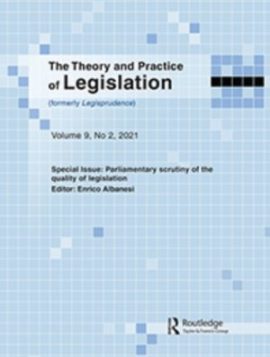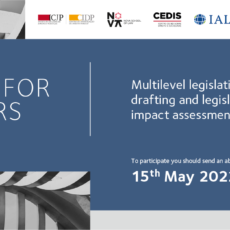
A special issue of The Theory and Practice of Legislation (Vol. 9, Issue 2, 2021), guest-edited by Enrico Albanesi, Associate Professor of Constitutional Law, Department of Law, University of Genova, and Associate Research Fellow, Institute of Advanced Legal Studies, University of London, has just been published. The special issue contains five articles. One article has been written by Enrico Albanesi: it sets the scene and creates some researching hypotheses for the following special issue. The other four articles focus on parliamentary scrutiny of the quality of legislation in different jurisdictions: Spain, Germany, Canada and the U.S.
The articles have been commissioned from academics who are experts in the field of legislative drafting and have also had practical experience in the field of legislative drafting and parliamentary affairs. Matthias Rossi is Chair of Constitutional, Administrative and EU Law and Legislative Studies at the Faculty of Law, University of Augsburg. Piedad García-Escudero Márquez is Chair of Constitutional Law at the Complutense University of Madrid, Letrada de las Cortes Generales (clerk of the Spanish Parliament) and former Secretary General of the Spanish Congress of Deputies. John Mark Keyes is Adjunct Professor at the Faculty of Law, University of Ottawa, and a former Chief Legislative Counsel in the Government of Canada. Sean J. Kealy is Clinical Associate Professor of Law at the Boston University School of Law.
In Continental Europe, Parliaments (although in a rather different range: more in countries such as Italy and Spain, less in countries such as Germany) have developed a more-in-depth approach in scrutinising the quality of legislation, i.e. a set of tools, standards and bodies to scrutinise it downstream, than that of Westminster jurisdictions. In the latter, a high-standard quality of legislation is guaranteed upstream by having bills drafted by Parliamentary Counsel, although in the United Kingdom there is currently a debate concerning the opportunity to strengthen parliamentary scrutiny of the quality of legislation. The hypotheses of the research were that the aforementioned models of parliamentary scrutiny are differently shaped in those jurisdictions due to the drafting model and the form of government established there. Against this background, the United States Congress is a very different animal: due to the peculiarities of the legislative process in the presidential system, the scrutiny in Congress relies on multiple parties. The reason why articles have been commissioned was to test on a larger scale the aforementioned hypotheses, which have already been partially proved in a previous article mainly concerning Italy (E. Albanesi, ‘Parliamentary Scrutiny of the Quality of Legislation within Europe’ (2021) Statute Law Review). As mentioned, the analysis focuses on two Continental European parliamentary systems (Spain and Germany), one jurisdiction belonging to the Parliamentary Counsel/Westminster model (Canada) and one presidential system (the U.S.). The articles published in the special issue seem to support on a larger scale the aforementioned hypotheses. The article on Canada also helps reflect upon the opportunity to strengthen parliamentary scrutiny of the quality of legislation in Westminster jurisdictions.
Read more here.





